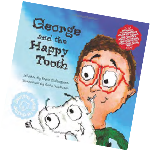Children’s teeth in the UK are in crisis.
Britain’s tooth decay epidemic statistics show that 23.3% of 5-year olds have tooth decay with an average of 3.4 teeth that are either missing or filled.
NHS data shows that more than 160000 children starting primary school already have tooth decay, with sugar being blamed for creating an oral health crisis.
Hospital teeth removals take place when a patient requires general anaesthetic, which cannot be given by a dentist and the NHS has spent £165 million on such treatment since 2012. This represents a crisis in dental health, brought on by excessive sugar intake among young people.
The link between oral health and speech and hearing.
Poor oral health causes unnecessary pain and suffering to the child, absence from school and the cost to the NHS is in the millions, but have we thought about how those missing teeth will affect speech development during this crucial window?
Teeth are for more than just chewing. They also play a big part in speech development and as their health can also impact on our hearing and wider communication skills.
While talking comes naturally to many of us, we sometimes forget how complex speech actually is. Humans typically learn how to talk by listening to and imitating those around them. This process involves a number of physical and neurological structures that work together to produce words, including the lips, the tongue, the jaw, the vocal cords and the teeth. When any of these important structures are not functioning properly, people may develop speech difficulties.
Teeth help us to produce all kinds of sounds, including “f” in ‘facts’, “v” in ‘van’, “s” in ‘summer’, “z” in ‘zebra’ the “ch” in ‘china’, the “sh” sound in ‘shoe’, and the “th” in ‘thirst’ or ‘that’. Think about all the words that use these sounds and imagine how missing or misaligned teeth might make speaking more challenging.
Having a tooth removed not only leaves a hole in the smile, it also affects speech. Losing a baby tooth early is especially detrimental since this can negatively affect the child at a critical time of speech development. It’s common for a child with a missing tooth to develop a speech difficulty which may require help from a speech and language therapist later.
Tooth decay is caused by pathogenic bacteria. These can enter the bloodstream and threaten a person’s overall health. Because of the ear’s proximity to the mouth, harmful bacteria that originate in the mouth can also inflame and narrow in the blood vessels located in the ears and brain, which are crucial to hearing health. Hearing impairments, temporary or permanent, can also impact on speech and language development in children.
What can we do?
Dental decay is 100% preventable.
The Relationships, Education, Relationships and Sex Education and Health Education guidance from the Department of Education (published in 2019) states that “pupils should know about dental health and the benefits of good oral hygiene and dental flossing, including regular check-ups at the dentist.” This is something that may be inspected by Ofsted as part of the education inspection framework. We should work towards promoting good practice amongst both dentistry and education professionals, so that we can support schools and families to deliver appropriate early support. By tackling oral health in early childhood, we can have a positive impact on overall health and wellbeing, as well as mitigating the impact of poor oral health on speech, language and communication difficulties.
So how can we make a change?

George and The Happy Tooth is an initiative designed to improve the oral and general health of children in the UK. Its colourful and fun design, with age appropriate characters, encourages a love of the book and associated resources. At Happy Teeth we believe that really simple messages are the key to effective oral health prevention education for children.
Key messages that we can take away from George and The Happy Tooth.
- Brush teeth BEFORE breakfast to remove bacteria and plaque that sugar sticks to.
- Use fluoride toothpaste with at least 1400ppm fluoride. Don’t rinse – leave the fluoride to work on the teeth to help strengthen enamel and prevent decay.
- Keep sugary snacks to mealtimes. Instead, choose healthy snacks including apples, carrots, or cheese in between meals.
- Drink water or milk throughout the day – sugary drinks wash over the teeth, creating a sugar attack with each sip.
- Try one of the experiments in the George and the Happy Tooth book.
- Visit your dentist at least every 6 months to make sure that teeth are happy and healthy.
If you would like to find out more about what we do at Happy Teeth go to https://www.happyteetheducation.com/
Follow us on Facebook @HappyTeethEducation & Instagram @happy_teeth_education
Please login to view this content
Login